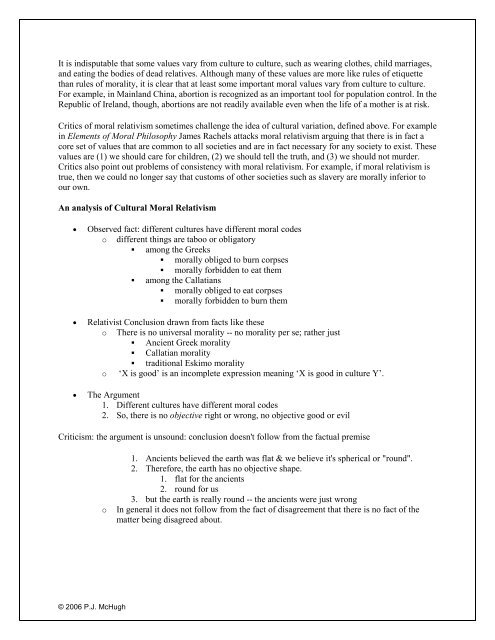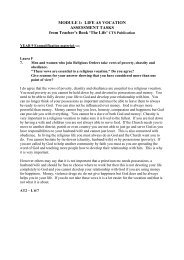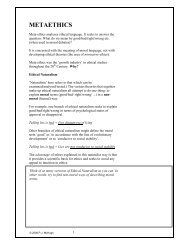You also want an ePaper? Increase the reach of your titles
YUMPU automatically turns print PDFs into web optimized ePapers that Google loves.
It is indisputable that some values vary from culture to culture, such as wearing clothes, child marriages,<br />
and eating the bodies of dead relatives. Although many of these values are more like rules of etiquette<br />
than rules of morality, it is clear that at least some important moral values vary from culture to culture.<br />
For example, in Mainland China, abortion is recognized as an important tool for population control. In the<br />
Republic of Ireland, though, abortions are not readily available even when the life of a mother is at risk.<br />
Critics of moral relativism sometimes challenge the idea of cultural variation, defined above. For example<br />
in Elements of Moral Philosophy James Rachels attacks moral relativism arguing that there is in fact a<br />
core set of values that are common to all societies and are in fact necessary for any society to exist. These<br />
values are (1) we should care for children, (2) we should tell the truth, and (3) we should not murder.<br />
Critics also point out problems of consistency with moral relativism. For example, if moral relativism is<br />
true, then we could no longer say that customs of other societies such as slavery are morally inferior to<br />
our own.<br />
An analysis of Cultural Moral Relativism<br />
• Observed fact: different cultures have different moral codes<br />
o different things are taboo or obligatory<br />
among the Greeks<br />
morally obliged to burn corpses<br />
morally forbidden to eat them<br />
among the Callatians<br />
morally obliged to eat corpses<br />
morally forbidden to burn them<br />
• Relativist Conclusion drawn from facts like these<br />
o There is no universal morality -- no morality per se; rather just<br />
Ancient Greek morality<br />
Callatian morality<br />
traditional Eskimo morality<br />
o ‘X is good’ is an incomplete expression meaning ‘X is good in culture Y’.<br />
• The Argument<br />
1. Different cultures have different moral codes<br />
2. So, there is no objective right or wrong, no objective good or evil<br />
Criticism: the argument is unsound: conclusion doesn't follow from the factual premise<br />
1. Ancients believed the earth was flat & we believe it's spherical or "round".<br />
2. Therefore, the earth has no objective shape.<br />
1. flat for the ancients<br />
2. round for us<br />
3. but the earth is really round -- the ancients were just wrong<br />
o In general it does not follow from the fact of disagreement that there is no fact of the<br />
matter being disagreed about.<br />
© 2006 P.J. McHugh
















